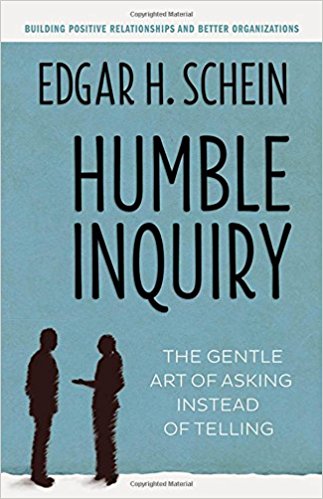Humble Inquiry
Schein, Edgar. (2013). Humble Inquiry. San Francisco: Berrett-Koehler.
Most of us do not like conversations or meetings that spend time telling us what we already know. Summary of the history yes, every detail, no. When statements are made, a lot of the time we just zone out or become secretly irritated. When I am asked questions, I respond differently, questions are more like an invitation to contribute. It is more of a feeling that the decision has not be finalized, and my contribution might be useful.
Not all questions are equivalent. Humble Inquiry is the fine art of drawing someone out, of asking questions to which you do not already know the answer, of building a relationship based on curiosity and interest in the other person. What seems to help move thinking along is asking the right questions.
Humility is required for learning. Humility signals ‘I don’t know, but am curious to find out how or what others know.’ We sometimes ask people with more experience, those who have already had successes, and being willing to learn from others. Humility is one of the things we look for in Stakeholder Centered Coaching to find good people who want to be better. Think about it, if you already know everything, what’s the point of a conversation.
Asking a question helps clarify what the other person wants. Schein relates the story in his book about his daughter coming down to his study to ask a question and he responded by saying she was interrupting his work. His daughter left crying. His wife came down and said his daughter just wanted to know if he wanted a cup of coffee. We can probably relate to this story because we’ve have done similar things – feeling guilty, making assumptions, and not clarifying the issue.
Here are some things Schein has learned from his experience.
- When the choice is between you or me, look for a way to explore us, the relationship itself.
- Ask an open question to get information that you need (a question that is not answerable with just a yes or no)
- When one is too busy with one’s own agenda but wants to display a caring attitude, what often works best is a small change in behavior, not a total revision of the relationship.
- A small change allows a brief interruption to get more information before making a big decision.
- The small change should invite joint problem solving.
- Small changes now avoid the need for big changes later.
- Humble Inquiry would have enabled a small change.
Control the process, not the content first. Content can follow and is enhanced when the process is right (Helping – see above).
Here are some other learnings that are distributed throughout the book.
- Don’t jump in telling answers until you know what the other person really needs to know.
- Don’t assume that the person with the question has asked the right question.
- Asking for examples is not only one of the most powerful ways of showing curiosity, interest, and concern, but also—and even more important—it clarifies general statements.
- Accessing your ignorance, or allowing curiosity to lead you, is often the best guide to what to ask about.
There are other examples with sample questions in the book specifically dealing with Diagnostic Inquiry, Confrontational Inquiry, and Process-oriented Inquiry.
Much of Schein’s work has great potential in meetings. Knowing that some meetings are not safe to ask questions, most people complain about meetings. These sample questions can help mediate a couple of problems with meetings. Many times there is encouragement to get into action before thinking.
Another problem with some meetings is “the culture of TELL.” We meet, the person with positional authority tells what to do, meeting is over. Most companies that are being successful have safe meetings exploring options and creative solutions.
Schein ends with a series of questions that might be useful.
- What is going on here?
- What would be the appropriate thing to do?
- What am I thinking and feeling and wanting?
If the task is to be accomplished effectively and safely, it will be especially important to answer these questions
- On whom am I dependent?
- Who is dependent on me?
- With whom do I need to build a relationship in order to improve communication
Developing Helping relationships is critical and using Humble Inquiry can lead to building trust and generating more ideas.
Schein’s third book, Humble Consulting, relates how these tenets are applicable to being a consultant. Consultants, of course, can be external or internal

